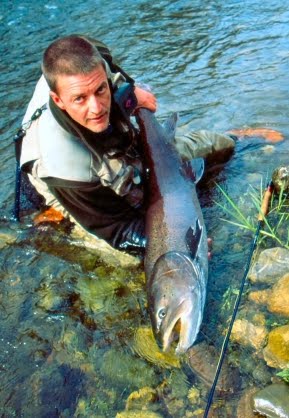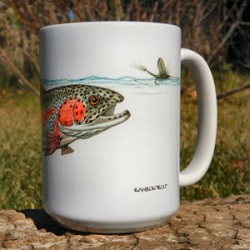April 4, 2011
Fly Fishing in Madagascar – Day 5
Americans and some Europeans are about the only cultures that follow tight schedules. Anywhere else on the planet being on time is of little importance. That’s why when George was approaching the hour late mark I still had confidence he was on the way. Sure enough at 8:30 AM he arrived as if he was on time.
George’s boat is decent. It certainly has some mileage on it. It’s about a 16 foot center console panga type boat with two 25 horse engines. One engine died on us several times today. Luckily George brought along a mate who constantly worked on the  motor while attending other odd jobs as well. He also had along four worn out big game trolling rigs. This is never a good sign as often it’s an indication that the guide really doesn’t have a clue about fly fishing or that the guide has no confidence in the method.
motor while attending other odd jobs as well. He also had along four worn out big game trolling rigs. This is never a good sign as often it’s an indication that the guide really doesn’t have a clue about fly fishing or that the guide has no confidence in the method.
We were headed north to fish the islands above the island of Nosy Be. It’s literally the end of a long Madagascar rainy season and the views along the way were simply green like you can’t imagine. It did not take long before we saw a heard of dolphin and a huge sea turtle.
Our fishing began with a school of charging bonito. George spotted them and with excitement shouted get ready. I grabbed my 8-weight Ross rigged with a Scientific Anglers Tropic Express 250 grain line and started stripping it off the reel. Bait was scattering everywhere and when we got close George cut the engines and we coasted in to the action. I launched off several casts and stripped at the speed of lightning but got nothing. We did this several times without success before George insisted we continue north for bigger fish.
 It took over an hour before the next cast. We were well out to sea and we could see the distant silhouette of the mountains of northern Madagascar. Our fishing area consisted of a jagged rock island with a ton of submerged reefs. Although the wind was light, large ocean swells tossed us around which is the norm for saltwater fly fishing. George simply said prepare for big fish, and looking like a kid on Christmas, I fumbled through my rods for my 12-weight. This would be a blind casting situation. My line on this rod was a SA 700 grain Bluewater Express – talk about heavy-sink.
It took over an hour before the next cast. We were well out to sea and we could see the distant silhouette of the mountains of northern Madagascar. Our fishing area consisted of a jagged rock island with a ton of submerged reefs. Although the wind was light, large ocean swells tossed us around which is the norm for saltwater fly fishing. George simply said prepare for big fish, and looking like a kid on Christmas, I fumbled through my rods for my 12-weight. This would be a blind casting situation. My line on this rod was a SA 700 grain Bluewater Express – talk about heavy-sink.
On about my 10th cast disaster struck. I heaved back in my backstroke and my reel crashed to the bottom of the boat. At first I thought I simply didn’t attach it to the rod well enough, but when I picked it up the screws that  hold the reel to the reel seat were gone. I’ve used this set up a bunch in Baja the last year so I was dumbfounded! The airlines I thought! Then the stress took over my body as here I was 10,000 miles from home at a place I may never have a chance to cast too again having equipment failure! I was losing time! Then without saying a word I stripped the 700 grain line off the reel carefully laying it in my handy stripping basket. Then I took the floating line off my 10-weight set up and reeled the 700 grain on it. Then as not to wreck the floater I reeled it back on the busted reel. And within ten minutes I’m proud to say I was casting again. A bit disgruntled, but casting again.
hold the reel to the reel seat were gone. I’ve used this set up a bunch in Baja the last year so I was dumbfounded! The airlines I thought! Then the stress took over my body as here I was 10,000 miles from home at a place I may never have a chance to cast too again having equipment failure! I was losing time! Then without saying a word I stripped the 700 grain line off the reel carefully laying it in my handy stripping basket. Then I took the floating line off my 10-weight set up and reeled the 700 grain on it. Then as not to wreck the floater I reeled it back on the busted reel. And within ten minutes I’m proud to say I was casting again. A bit disgruntled, but casting again.
 To make a long story short, I pounded the water for the next five hours without anything. George put me on many more gorgeous reef areas. We chased busting tuna and mackerel and dredged strong current lines where he frequently catches sailfish and marlin. But I got nothing. This was not appearing to be my day. By now it was about 95° and I can tell you such heat didn’t help much. Granny was bored and I was losing confidence. Miraculously however, George was still full of energy and seemed fully behind the fly fishing. When I stopped casting, he’d say change flies or say no resting with a smile. I couldn’t tell if he was trying to break me so I’d troll or if he really knew something.
To make a long story short, I pounded the water for the next five hours without anything. George put me on many more gorgeous reef areas. We chased busting tuna and mackerel and dredged strong current lines where he frequently catches sailfish and marlin. But I got nothing. This was not appearing to be my day. By now it was about 95° and I can tell you such heat didn’t help much. Granny was bored and I was losing confidence. Miraculously however, George was still full of energy and seemed fully behind the fly fishing. When I stopped casting, he’d say change flies or say no resting with a smile. I couldn’t tell if he was trying to break me so I’d troll or if he really knew something.
 For those of you that know me, breaking me wasn’t an option, so although I was in some ways going through the motions, I kept on going. Sure enough, we got close enough to a school of skipjack tuna and I got one. Then another. And another and before I knew it I landed eight skipjack tuna. Soon Granny realized fishing was worth it so I handed her the rod and she caught a few while I took my first rest of the day.
For those of you that know me, breaking me wasn’t an option, so although I was in some ways going through the motions, I kept on going. Sure enough, we got close enough to a school of skipjack tuna and I got one. Then another. And another and before I knew it I landed eight skipjack tuna. Soon Granny realized fishing was worth it so I handed her the rod and she caught a few while I took my first rest of the day.
We chased and caught skipjack tuna for at least a couple hours. There are many species of these smallest of the tuna family. These look like ones I’ve caught at Christmas Island but it will take some photo studying to really tell. Every one we caught was on  a small light colored Puglisi type baitfish pattern I had in my box. You didn’t even have time to strip the fly if you could reach the busting fish. They just destroyed the bait pattern when it hit the water.
a small light colored Puglisi type baitfish pattern I had in my box. You didn’t even have time to strip the fly if you could reach the busting fish. They just destroyed the bait pattern when it hit the water.
It was about 3 PM and it was time to at least start heading the direction back to Sakatia Island. George’s friend put two big trolling rods out with sailfish rigs made with some of the skipjacks we caught. Granny and I relaxed as we began the fast troll. We saw plenty of busting tuna and trolled through them hoping the billfish were below but each frenzy went without a strike.
 I thought I was done fly fishing for the day when I saw what I thought was a barracuda explode from a distant tuna school. George saw it too and the boat sped up towards that direction. Again a long narrow bodied fish scattered all kinds of baitfish. It was still too far to identify the species but then it sky rocketed (I’m not kidding) 12 feet in the air! It was the unique specie of king mackerel only found in the Indian Ocean and the very western part of the Pacific Ocean.
I thought I was done fly fishing for the day when I saw what I thought was a barracuda explode from a distant tuna school. George saw it too and the boat sped up towards that direction. Again a long narrow bodied fish scattered all kinds of baitfish. It was still too far to identify the species but then it sky rocketed (I’m not kidding) 12 feet in the air! It was the unique specie of king mackerel only found in the Indian Ocean and the very western part of the Pacific Ocean.
My heart pumped wildly and I pulled out my 12-weight as we bounced our way to the action. Praying it wouldn’t tangle, I stripped my line to the bottom of the boat. I was trembling with excitement. When the engines  cut I launched my first cast. We were coasting so fast that my cast was quickly dragged and never had time to sink. I stripped the heavy sink line back and made another cast. This time my angle and sink was perfect, however, the feeding frenzy was already over. As I stood in the bow I gazed the horizon looking for the action to reappear. Then I stripped fast from the depths. That’s when I got jolted.
cut I launched my first cast. We were coasting so fast that my cast was quickly dragged and never had time to sink. I stripped the heavy sink line back and made another cast. This time my angle and sink was perfect, however, the feeding frenzy was already over. As I stood in the bow I gazed the horizon looking for the action to reappear. Then I stripped fast from the depths. That’s when I got jolted.
Catching one of these Indian Ocean king mackerel on any type of tackle is an accomplishment. To be lucky enough to have one of size eat your fly is a near miracle. And to land him even more so. These were the thoughts racing through my head. Furthermore, as my Ross Momentum #6 spun uncontrollably my final thought was that I must have a tuna rather than the mackerel. George, who has no idea what my experience is, was very  concerned that I was over pressuring the fish. But the truth is, you can let a blue water fish like a tuna fight you or you can fight them. I fight them. I practically point my rod to the fish and pull the second their first run is done. I bend down with my legs, reeling my rod tip into the water as I bend, and then I stand up and pull. I repeat it over and over until I win. Only when the fish really pulls or feels like he is going crazy do I let him go far. The fish rarely breaks off because there is so much stretch in your backing, fly line and even your leader if made with Bimi twists.
concerned that I was over pressuring the fish. But the truth is, you can let a blue water fish like a tuna fight you or you can fight them. I fight them. I practically point my rod to the fish and pull the second their first run is done. I bend down with my legs, reeling my rod tip into the water as I bend, and then I stand up and pull. I repeat it over and over until I win. Only when the fish really pulls or feels like he is going crazy do I let him go far. The fish rarely breaks off because there is so much stretch in your backing, fly line and even your leader if made with Bimi twists.
I followed this process for about five minutes and there was my fish, a gorgeous narrow-barred king mackerel. I couldn’t believe it! Granny fired off some photos as the fish came to boat side. George was frantic. Not only was he a bit surprised we got this fish on the fly but he was rightfully scared of it. All king mackerel have razor sharp teeth. One careless move and you could end up with a severe gash or even lose a finger.
 Now we were at a time of debate. Granny and I had made it very clear to George that we wanted to release all fish except a few for dinner. We already had a few skipjack tuna. George reluctantly asked if we had to let it go. I know how delicious a wahoo tastes and this fish looked every bit like a wahoo. “George, we will eat him too”, I shouted. George was relieved and on the next pass George sunk the gaff. I’d landed what will probably be the fish of the trip, and perhaps 2011, a gorgeous narrow-barred king mackerel!
Now we were at a time of debate. Granny and I had made it very clear to George that we wanted to release all fish except a few for dinner. We already had a few skipjack tuna. George reluctantly asked if we had to let it go. I know how delicious a wahoo tastes and this fish looked every bit like a wahoo. “George, we will eat him too”, I shouted. George was relieved and on the next pass George sunk the gaff. I’d landed what will probably be the fish of the trip, and perhaps 2011, a gorgeous narrow-barred king mackerel!
Day one with George was fantastic. Sure, I caught a great fish and we got into numerous tuna on the fly, but what was best is that George is a fun guy that knows his stuff. George showed up with a plan and he stuck to it. He said he’s only seen a fly rod two other times but he kept the confidence even though our morning was slow. George is very cool and we should have a great next three days.
 As you can imagine, tonight Granny and I as well as our Sakatia Tower staff ate big. We had tuna Carpaccio for appetizers and mackerel steaks for dinner. This should be a great trip! I can’t wait to see what tomorrow will bring.
As you can imagine, tonight Granny and I as well as our Sakatia Tower staff ate big. We had tuna Carpaccio for appetizers and mackerel steaks for dinner. This should be a great trip! I can’t wait to see what tomorrow will bring.
(Remember, it may take a few days for the next entry. But April 5 will come. Internet is hard to find here in Madagascar.














Jeff!!! That was a great read and an awesome fish… The BVFF Board is paying to have you, Peet, and Phil come to our fly fishing expo. I can’t wait!!!
Erik
Jeff, Outstanding blog from Madagascar. Thanks for sharing and safe travels. Patrick Kelly
Hi Erik & Patrick, I’m glad you guys are enjoying! I’ll keep doing my best to catch cool fish and post some unique animals too. Erik, I’ll be home next week. Please email me with a number I can call you. I need to check on those BVFF show dates. I’m booked a bunch of 2012 already. Thanks!
Jeff, some of my biologist friends at UC Berkeley have spent a lot of time in Madagascar, but not for the fishing. It’s an amazing place by all accounts. So glad that you and Granny went there and took the time to share some of your experiences. PK